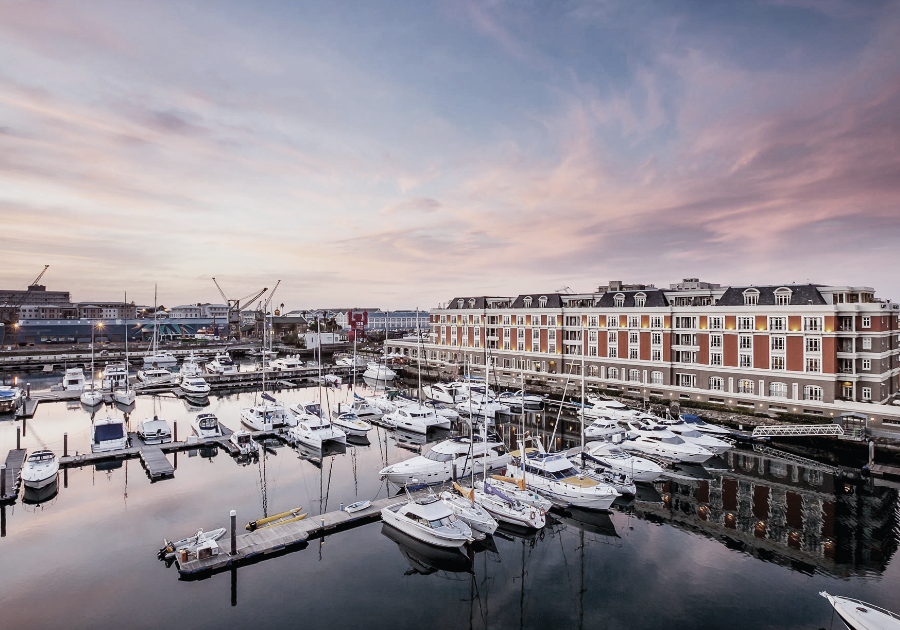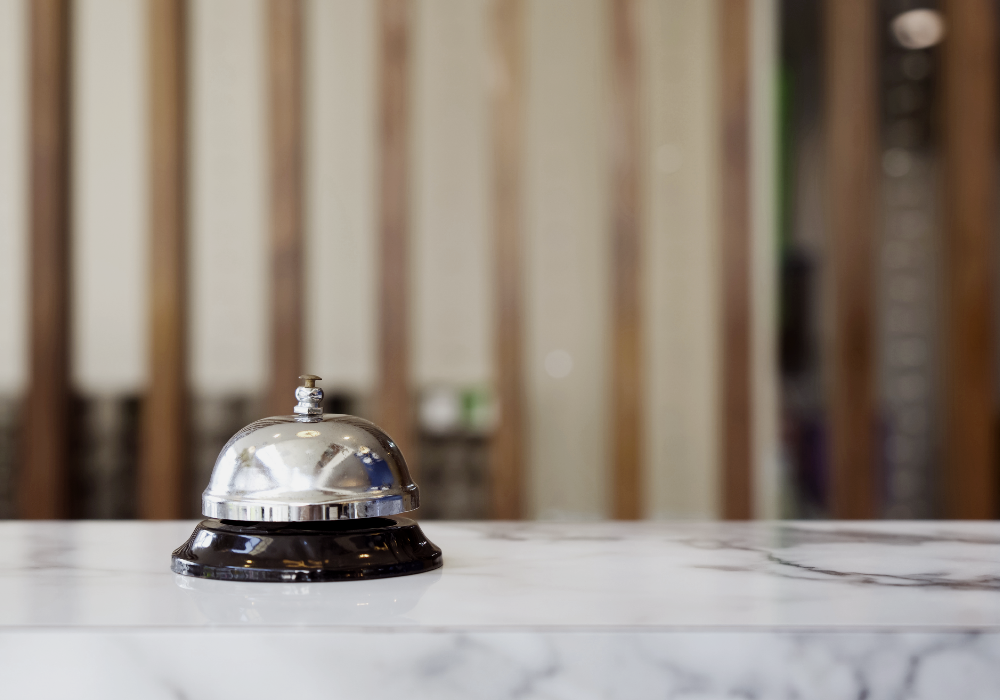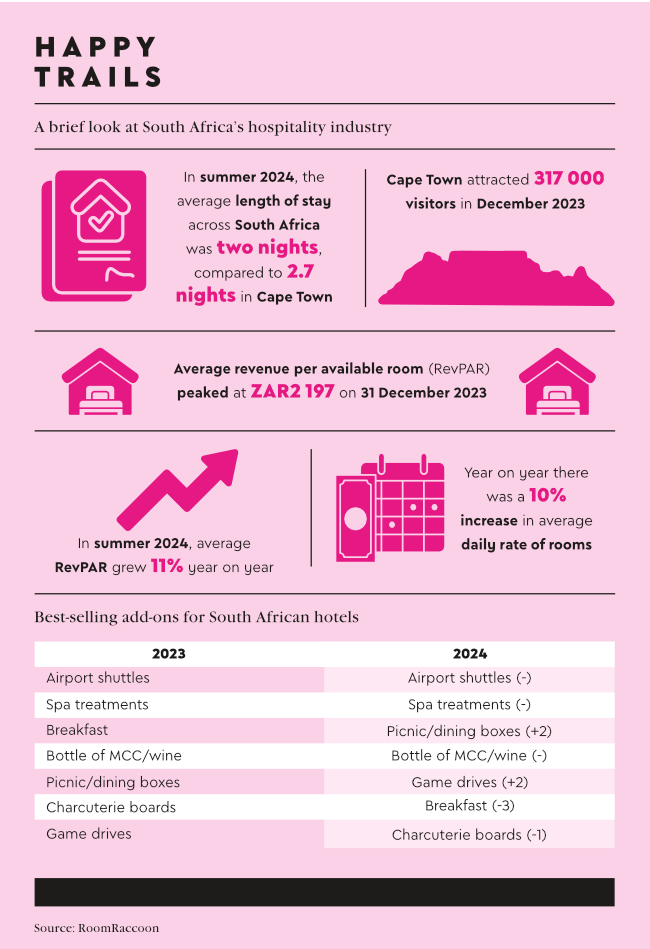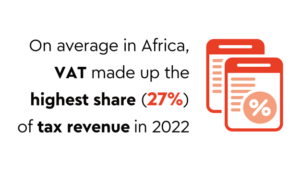How time flies. It was almost half a century ago – 45 years – that the very first casino hotel in the Sun City resort was built at what was then the astronomical cost of ZAR30 million. Many hundreds of millions have been spent since then adding to Sun International’s mini-kingdom in South Africa’s North West province – in 1992, for instance, ZAR830 million was invested in the Palace of the Lost City. One estimate suggests that at least ZAR1 billion has been invested in the sprawling complex of hotels and leisure facilities over the past decade alone.
The most recent project in the complex was the ZAR265 million Lefika Villas project, in the Pilanesberg nature reserve adjoining Sun City. Designed and landscaped by South African design firm Boogertman and Partners, the project comprised clusters of villas (48 three-bedroom villas, 10 four-bedroom villas) that drew inspiration for their natural surroundings.
‘The buildings are true to their context in the choice of materials, using stone harvested on site as one of the main building materials,’ says Onthatile Makgalemela, marketing manager for Boogertman. ‘The architecture’s integration with the natural environment is further enhanced by emulating green planted roofs; this is achieved by strategically placed planters on the building edges. The surrounding nature truly becomes the palette of the new development.’
Now the original Sun City hotel is getting a makeover. While it was spruced up in 2016, the latest ZAR350 million revamp will see a complete overhaul of all 340 guest rooms between now and 2026, the decor drawing inspiration from Sun City’s Tswana roots.
The first 56 rooms are expected to be ready for the Nedbank Gold golfing challenge in November 2024, which attracts top-tier golfers from around the world.
The hotel’s glow-up is but one indication that the hospitality sector is being revitalised. According to Stan Whiting, of hospitality consultancy Moore South Africa, the entire continent’s hotel sector is poised for substantial growth, projected at an annual rate of 6.5% over the next decade.
This is of course thanks in part to vastly improved tourism statistics. Figures released in mid-July by Tourism Minister Patricia de Lille showed that South African tourism grew by 9.7% to about 3.8 million arrivals between January and May 2024, compared with a year ago. Direct spending by overseas visitors rose 27.5% to ZAR95.1 billion in the 2023/24 financial year, she told Parliament.
According to hotel-management systems provider RoomRaccoon’s 2023–2024 Summer Hospitality report, which surveyed more than 200 independent hospitality facilities in South Africa, the average revenue per available room leapt 11% year on year.
‘When comparing the data from summer 2023 to 2024, the average revenue per available room increased from ZAR1 340 to ZAR1 493. This figure peaked at ZAR2 197 on 31 December 2023,’ says Niels Verspui, market head of RoomRaccoon South Africa. ‘During the last two summer seasons, the occupancy rate at South African hotels remained consistently high, averaging 62% in 2022–2023 and 63% in 2023–2024.
‘What’s particularly noteworthy is that despite the steady occupancy levels, hoteliers have significantly increased the average daily rate of rooms. In fact, year over year, there was a 10% increase,’ he says.
In the South African hospitality space, it seems hoteliers are largely improving what is already there and not building anew, with a multitude of iconic hotels being refurbished and reopening under new management.
Several stand out – among them the Table Bay Hotel, which has pride of place in Cape Town, located practically on Africa’s doorstep, at the entrance to Table Bay in the Victoria & Alfred Waterfront. Opened in 1997 by President Nelson Mandela, the hotel has hosted many visiting dignitaries over the years, including presidents and royalty. It has been operated by Sun International under licence until now.
The operation of the hotel, while still being managed by Sun International, has been taken over by IHG Hotels & Resorts, and the rebranded and revamped Intercontinental Table Bay at the V&A Waterfront will open its doors in late 2025. The ZAR1 billion revamp will include 306 rooms, including 45 new guest suites, a new elevated pool bar and terrace, a signature spa and an Intercontinental loyalty club floor and lounge.
Across Table Bay harbour, the Cape Grace, which also boasts a prime spot, with the international yacht basin in its ‘front yard’, has also changed hands. Now owned by the Qatar-backed Kasada Hospitality Fund, the refurbished hotel recently reopened as a fully branded Fairmont property. ‘We are noticing a real momentum in South Africa for luxury hotel brands, and we couldn’t think of a more iconic hotel than Cape Grace to establish our footprint in the country,’ says Mark Willis, CEO of Fairmont Hotels & Resorts.
In Johannesburg, the game of hotel musical chairs continues. Here Thailand-based Minor Hotels is making its first foray into Africa with its NH Collection, taking over the management of another star in the South African hospitality firmament – the Sandton Hilton, which was opened in 1997 by the then-Prince Charles. In collaboration with the Cavaleros Group, Minor Hotels will rebrand the 329-key property as NH Sandton and, following an extensive refurbishment of the property, it will be finally rebranded as NH Collection Sandton.
The Hilton group, meanwhile, has moved only a few kilometres across Sandton to Grayston Drive, where it is expected to open its first Hampton-by-Hilton hotel in Africa in Q4:24. The group has been quite active on the continent, opening new hotels in the DRC, Morocco and Tunisia in 2023.

Further north in South Africa and taking advantage of the thriving tourism sector in the Kruger National Park, the Radisson group has opened its first safari lodge hotel.
‘The opening of Radisson Safari Hotel Hoedspruit marks our 11th hotel opening in South Africa and completes our own Golden Triangle Safari offering with exquisite properties in Cape Town and the recently opened Radisson Blu Resort Mosi-oa-Tunya in Livingstone,’ says Tim Cordon, COO of Radisson Middle East and Africa.
Radisson has big ambitions for sub-Saharan Africa, aiming to reach 25 hotels by 2030. ‘We are prioritising, through either management or franchise models, conversions for quicker market entry and exploring strategic collaborations with existing management companies to increase our footprint,’ says Daniel Trappler, Radisson’s senior director of development, sub-Saharan Africa.
It is refurbishing a number of its South African properties, including Radisson Blu Gautrain Hotel in Sandton and Radisson Blu Hotel Waterfront in Cape Town. In addition, the Park Inn on Cape Town’s Foreshore has been rebranded as a Radisson Hotel.
It’s not only the swish end of the market that’s attracting investment. Premier Hotels & Resorts has just finished building a four-star hotel in Thohoyandou in Limpopo’s Venda region. With easy access to Kruger’s Punda Maria gate in the north-east, it serves as a gateway to both Zimbabwe and the national park.
Meanwhile, the Johannesburg-based Curiocity company, launched by local entrepreneur Bheki Dube in 2013, is opening the second if its hybrid hotels in Cape Town, complementing its Green Point property with one on vibey Kloof Street. Curiocity’s selling point is its reasonable rates combined with an experiential offering. For instance, the group hosted 20 artists in Cape Town as part of the 2024 International Public Art Festival.
‘These collaborations are key to Curiocity’s success. Any hotel can be a hotel, but our partnerships with local creatives and storytellers make us stand out. Curiocity is very experience-led, meaning guests don’t just stay in a hotel room; they immerse themselves in the neighbourhood, guided by local storytellers who share the narrative of the area and the country,’ says Dube.
Also locking into the trend towards collaboration, Dream Hotels and Resorts, which has 23 properties across South Africa, is partnering with CityBlue Hotels, with a portfolio extending from Kenya and Tanzania to South Sudan, to undertake joint marketing campaigns and co-branded promotions.
‘A rising tide lifts all boats,’ says CityBlue MD Jameel Verjee. ‘By working together we are creating greater scope for future business opportunities and strengthening pan-African collaborations, which ultimately leads to a more resilient, robust and unified industry.’


















